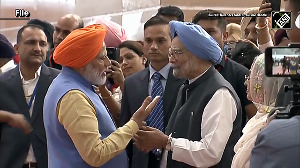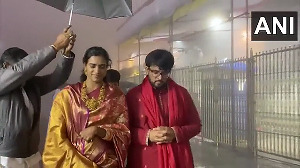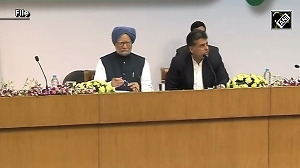When you're a features writer, you end up having to make up lists. Of greatest this and worst that. Of gangster movies. Of soundtracks. Of cricketers. Of Michael Schumacher's finest overtaking maneuvers. Of the scariest films ever. Of whatever in the world the editor whimsically wants to see a list of. Of whatever harebrained idea comes to you at three in the morning.
Some lists, of course, are harder than others. This week, I'm going to vainly attempt a weak defense of this one series of lists -- on the greatest English-language films of all time, covering the 1960s, the 1970s, the 1980s, the 1990s and the, um, 00s -- I did recently that proved to be a truly gruelling task, and brought me much argumentative e-mail.
Yet the point of this piece isn't in that defense (which'll pop around much later) or grumbling about how difficult listmaking can be; it's about how irresistibly addictive, how much goshdarned fun it is.
 Have you read Nick Hornby's High Fidelity? The 1995 novel is a lark about a record-store owner with serious relationship woes, but what makes it special is its all-consuming obsession with Top-Five lists, lists of anything and everything. From 'Five best side-one track-one songs of all time' to 'Five bands or musicians that will have to be shot come the musical revolution,' store-owner Rob and employees Dick and Barry quibble and obsess over tiny nuances and niceties.
Have you read Nick Hornby's High Fidelity? The 1995 novel is a lark about a record-store owner with serious relationship woes, but what makes it special is its all-consuming obsession with Top-Five lists, lists of anything and everything. From 'Five best side-one track-one songs of all time' to 'Five bands or musicians that will have to be shot come the musical revolution,' store-owner Rob and employees Dick and Barry quibble and obsess over tiny nuances and niceties.
The fight is about details, sure, but -- and here's the crucial bit -- they are details that don't matter.
Fanboys love lists and I'm no exception, simply because its dashed enjoyable to pretend to be empirical about something that you can't possibly formulate like math. Film is a matter of opinion and there are millions of points of view on the same movies, and none is less valid than the other. You like it, sat through it, worship it, hate it -- and we could all be arguing about the same movie. And we'd all be right.
The fun, of course, lies in the debate. In the pointless attempts at defining if the Goldfinger 'painted-gold' scene rates higher than the catfight in From Russia With Love. If Amitabh's drunken slurring in Satte Pe Satta beats his cockroach rant in Hum. And so on and so forth. It's all madness and inane and can't possibly come down to numbers and rankings, no matter how many critics think so. (For the record, about these two: 'yes, it does,' and 'no way,' respectively.)
 Thing is, in trying to decide who scores higher than who and which scene is better than what and so on, you end up looking at the subjects a lot closer. You watch/hear/read and compare (mostly unfairly) but you willingly immerse yourself in the subjects of your list, trying to get closer and closer as you decide whether #8 really deserves to be a step higher than #9.
Thing is, in trying to decide who scores higher than who and which scene is better than what and so on, you end up looking at the subjects a lot closer. You watch/hear/read and compare (mostly unfairly) but you willingly immerse yourself in the subjects of your list, trying to get closer and closer as you decide whether #8 really deserves to be a step higher than #9.
Fanboys spend as much time arguing in blissful futility about fantasy lists, about what actors should play what characters and what movie sequels should be made -- as if any one of us -- or, for that matter, editorial-roomful of people -- has the right to use that 'should.' Hah. Yet we do it because it's tremendous fun to pretend, and you're never too old to playact.
 So then, these English-language movies, and the hardest lists I've ever had to make. (Actually, strike that. I once had to define The Ten Best Indian Movies Ever, and it was exasperating to the hilt. I tried and prefaced my list with a comment on inadequate subtitling and sticking to what I know best, but who reads the intro when the list is just two inches below that?)
So then, these English-language movies, and the hardest lists I've ever had to make. (Actually, strike that. I once had to define The Ten Best Indian Movies Ever, and it was exasperating to the hilt. I tried and prefaced my list with a comment on inadequate subtitling and sticking to what I know best, but who reads the intro when the list is just two inches below that?)
It's always hard to try and map out highlights of as abstract an art as cinema over a prolonged period of time, and these decade-wide lists were an absolute pain. There's a profound sadness in having to leave out wonderful films, and after reading all your mails on the subject, here are the films I totally agree should belong there -- but films I couldn't find room for. Goddamned inadequate number, that 10.
The 1960s: Bonnie And Clyde, man. A seminal film that defined a generation of Hollywood filmmakers. Yet also a film overshadowed, especially in impact, by films influenced directly from it, like The Godfather. Also, Stanley Kubrick's Lolita, the most deftly handled and acted adaptation of a truly unfilmable novel. Wow. Yet we had two Kubricks in there already, and I'm darned if I have to take out Dr Strangelove or 2001: A Space Odyssey. Perish the thought.
 The 1970s: Francis Ford Coppola's The Conversation was a huge miss, and remains my absolute favourite Gene Hackman film. However, one look at this list will show you that the ten are films that can't be knocked out, and most have had a far greater cultural significance than this little gem. There's also Sidney Lumet's Dog Day Afternoon -- boasting of Al Pacino's greatest performance ever -- a truly flawless film, but definitely beaten to the punch by Lumet's own Network. Also left out, two of the best-written comedies in history, Love & Death and Monty Python And The Holy Grail. Sigh.
The 1970s: Francis Ford Coppola's The Conversation was a huge miss, and remains my absolute favourite Gene Hackman film. However, one look at this list will show you that the ten are films that can't be knocked out, and most have had a far greater cultural significance than this little gem. There's also Sidney Lumet's Dog Day Afternoon -- boasting of Al Pacino's greatest performance ever -- a truly flawless film, but definitely beaten to the punch by Lumet's own Network. Also left out, two of the best-written comedies in history, Love & Death and Monty Python And The Holy Grail. Sigh.
The 1980s: I still feel bad for leaving out Kubrick's The Shining, arguably the greatest horror movie ever made. Yet we'll let that loopy denouement be its cause of omission, no matter how effective the film. Also, no Kiss Of The Spider Woman? Sigh. Running out of excuses, but will reiterate its obscurity compared to the great cult hits that make up most of the ten.
The 1990s: This one caused a bit of an uproar with most of you feeling I'd overdosed on Quentin Tarantino. A realistic accusation, but the fact remains that both Reservoir Dogs and Pulp Fiction are two of the most creative films of all time. I feel really gutted for leaving out The Truman Show for its prescience, and Schindler's List for its sincerity -- not to mention The Big Lebowski for its coolth -- but this really was a tough list to cut down, and the ten on board just asserted themselves automatically.
 The 2000s: This was a list I didn't want to make, really. The decade isn't over, but one does these things for the sake of completion. I refute objections against Moulin Rouge! and Kill Bill, simply because English cinema reached new levels of visual spectacle with both films, which also married images and music incredibly well. The one that really deserved a spot was my favourite film from last year, the lovely little Once. Yet both The Dark Knight and Wall-E claim a greater cultural impact, it seems. Whatever. This one we'll do again in 2011. Promise.
The 2000s: This was a list I didn't want to make, really. The decade isn't over, but one does these things for the sake of completion. I refute objections against Moulin Rouge! and Kill Bill, simply because English cinema reached new levels of visual spectacle with both films, which also married images and music incredibly well. The one that really deserved a spot was my favourite film from last year, the lovely little Once. Yet both The Dark Knight and Wall-E claim a greater cultural impact, it seems. Whatever. This one we'll do again in 2011. Promise.
Readers, thanks so much for all your terrific mail on the lists above. Loved all your suggestions and wished we could take them all on board, but consider this piece an apology for not including some of your favourites: As you can see, I didn't include several of mine either. Sigh. Keep those fantastic inputs coming at senterfold@rediffmail.com. And oh, the Cruel Review Contest closes at the end of the year, so bring out your venom and write in now. Cheers, and see you next week






 © 2024 Rediff.com -
© 2024 Rediff.com -